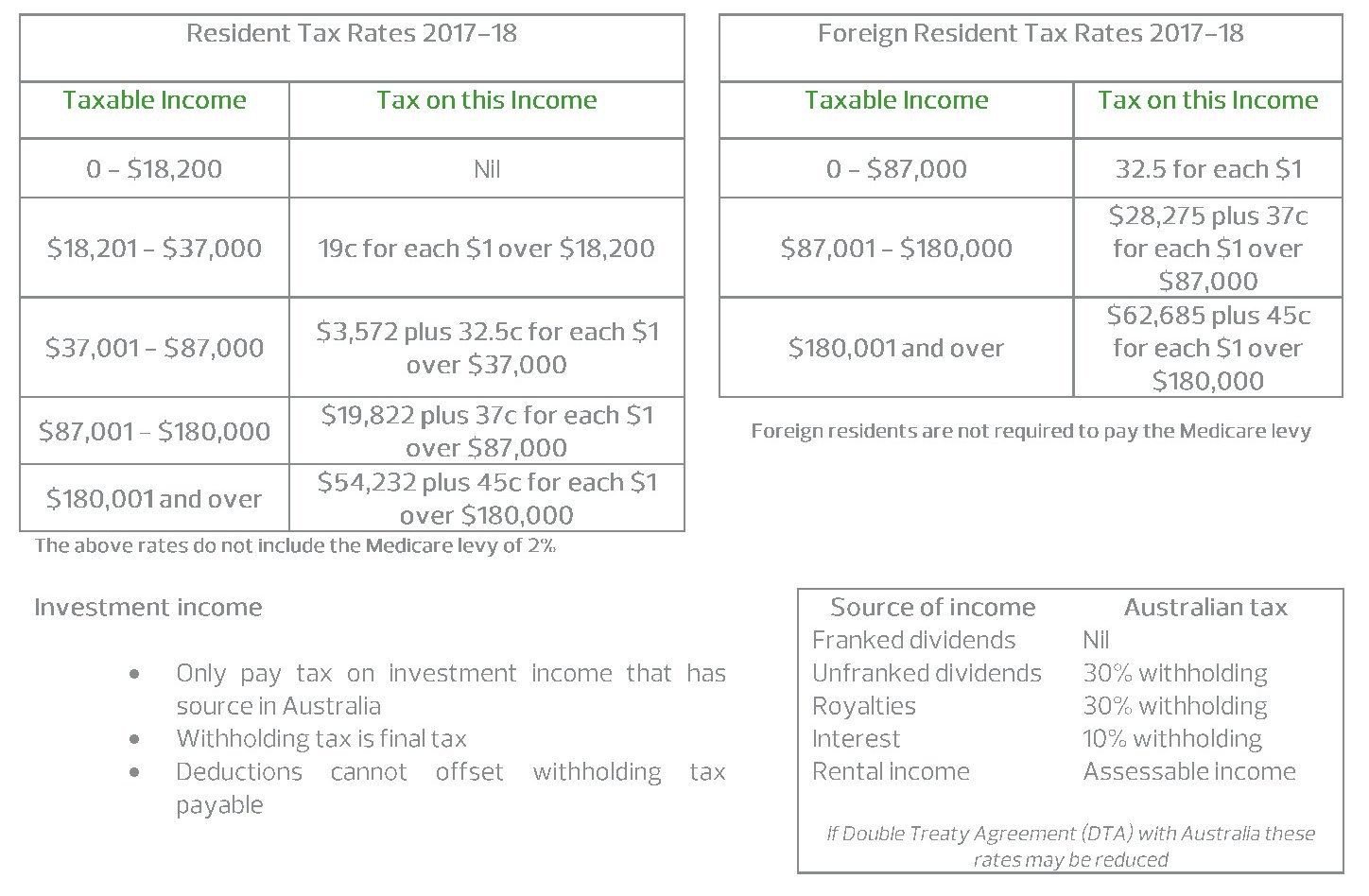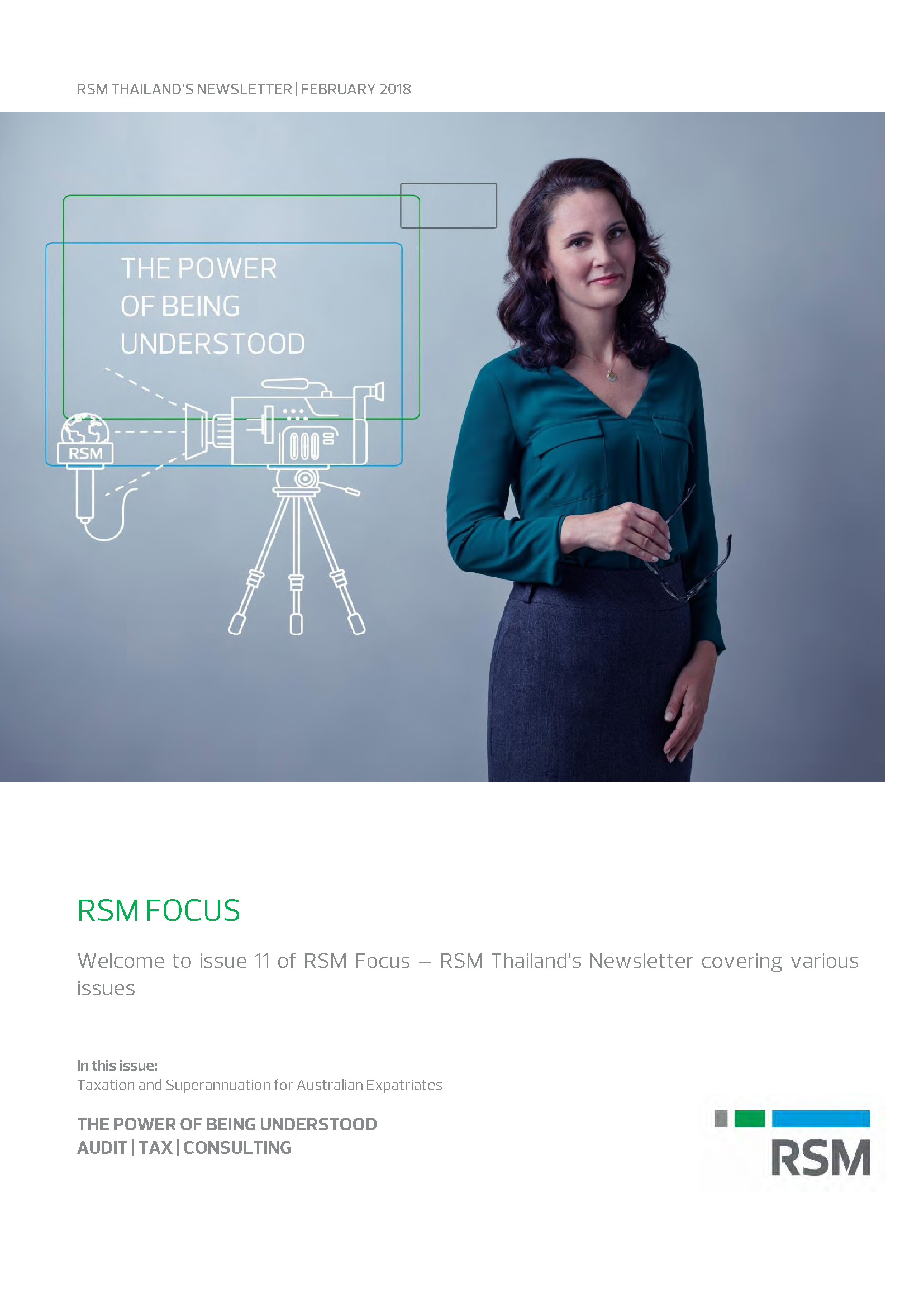RSM FOCUS
Welcome to issue 11 of RSM Focus – RSM Thailand’s Newsletter covering various issues
Introduction
On Wednesday, 7 February, RSM Thailand Tax Services in collaboration with Mr. Stephen French of MMT Accountants & Advisers, a business advisory practice with offices in Sydney Central Business District and Hurstville and Mr. Stephen Caswell an economist and qualified accountant of Caswell Consulting in New South Wales sponsored the first 2018 Australian Thai Chamber of Commerce Sundowner Networking Function. Prior to the networking event, a seminar was conducted by Mr. French and Mr. Caswell covering various taxation and superannuation changes and proposed changes which most importantly are likely to have serious effects on Australian-Expatriates. This edition of RSM focus deals with the topics covered at the seminar.
Selling your Australian home, while you’re overseas
There are many people who have moved overseas and own their “main residence” who believe that their home is not subject to any taxes and this may not necessarily be the case. An Australian-Expatriate’s ‘main residence’
(his or her home) is generally exempt from capital gains tax (CGT).
Generally, a dwelling is considered to be an Australian Expatriate’s main residence if:
- His or her family live in it;
- His or her personal belongings are in it;
- it’s the address his or her mail is delivered to;
- it’s his or her address on the electoral roll; and,
- services such as gas and power are connected.
Currently, if an Australian-Expatriate moves out of his or her main residence, he or she can choose to have that home remain as their ‘main residence’ for tax purposes. Even if they rent it out. This is called the temporary absence exemption. They can do this for up to 6 years if they rent it out (the “6 year rule”), and indefinitely if it is not rented out.
The Six Year Rule:-
- The exemption from capital gains can apply for a period of up to six years from when the family home was first rented out;
- The exemption from capital gains only applies where there is no other property nominated as their main residence during this period; and,
- If the expatriate returns to live in Australia before this six year period is up and takes up residence again, then the six year rule can start again from the date it next becomes income producing.
Budget 2017–2018: Reducing Pressure on Housing Affordability
In every budget, there are winners and losers, but sadly Australian Expatriates and non-resident Australians living and working overseas were the clear losers in this budget. For several years now the Australian Government has introduced legislation targeting expatriate and foreign residents. The 2017-18 budget continues that focus with further changes that will have a significantly negative impact on non-residents, particularly those who own a main residence back in Australia.
Removal of the main residence exemption for foreign residents:-
- Stops foreign residents from claiming the exemption;
- Applies from Budget night 9 May 2017;
- Foreign residents that hold property on Budget night can continue to claim the exemption until 30 June 2019; and,
- The reform has still not been read or passed by parliament.
Case Study (1)
In July 2015, Jon & Dany, moved from their home in Sydney to Bangkok. Since moving, they have rented out their property and continued to treat their Sydney home as their main residence. On 4 September 2019 while remaining non-residents, they exchange contracts to sell their Sydney home. What would Jon & Dany’s tax implications be under the current law and then under the proposed changes?
Currently, Jon & Dany could apply the absence rule for up to 6 years to treat the property as their main residence. As the current law allows for foreign residents to apply the exemption, no tax will be payable on the sale.
Proposed Law:
As Jon & Dany were foreign residents at the time of the sale they are:
NOT entitled to the main residence exemption.
This means they will have to pay Capital Gains Tax (CGT) on their gain.
This outcome is not affected by:
- Previously using the dwelling as their main residence or;
- The absence rule.
Proposed Law = A Significant Negative Impact for Australian Expatriates
- Denies foreign residents access to the CGT main residence exemption from 9 May 2017;
- Existing properties held prior to this date will be grandfathered until 30 June 2019;
- No account will be taken of the 6 years rule unless the owner was a tax resident of Australia at the time of sale;
- There is no apportionment of the main residence exemption, either based on days of ownership over the whole period as an Australian resident or as a non-resident; and,
- The proposed CGT main residence exemption removal applies on an “all or nothing” basis.
Proposed Law = Tax Implications
- Will there still be some access to a pro rata of the main residence exemption?
- Will that part of the gain relating to the non-resident period be subject to CGT? Will the 50% discount apply to any of the gain?
- In the extreme it could mean that an Australian expatriate who has been overseas for say five years, and rented out their main residence on the presumption that the “6 year rule would apply” would lose the entire CGT exemption if the sale was not effected prior to 30 June 2019.
- A more equitable approach would result in there being a deemed disposal and reacquisition of foreign owned properties on 1 July 2019 at market value.
- If foreign ownership of property is maintained after this date, market valuations would be required to exempt (to some extent) any gain accrued to this date. CGT would apply in relation to the capital gains accruing after that date.
What to do next?
- It will be even more important now for Australian expatriates to obtain tax advice before disposing of any assets.
- The timing of any sale in the future will be crucial as will an individual’s tax residence or non-residence status.
- It is possible that some expatriates may be better placed selling properties with large capital gains prior to June 30, 2019 – particularly if they have little or no intention of returning to Australia, for example if they intended to retire overseas.
- Foreign residents may wish to keep detailed records of non-deductible costs associated with their main residence to help maximise their cost base for the calculation of their capital gain.
- For Australian residents considering taking up employment opportunities overseas, careful planning is required to ensure that the impact on tax residency is fully considered and understood.
What are the investment benefits of becoming a non-resident?

Capital gains tax
- Once individual stops being resident of Australia – no effect on investor’s taxable Australian property (8 May 2012).
- For other assets, for example equities, potential deemed disposal.
- Choice available to investor:
- Pay tax on gain accrued to that point
- Not pay tax at this point but leave future accruing gain within Australian tax system
- Choice between paying sooner or paying more.
- Should the client pay CGT at the time that they become non-resident or defer gain?
- Consideration to time expected to be non-resident and market movement
- Existing unrealised capital losses
- Should client re-weight portfolio in favour of non-taxable Australian assets i.e. shares?
What happens to an Australian’s superannuation accounts when they move to work overseas? Are there any benefits of maintaining or growing Australian based investments, including superannuation?
Superannuation
- Eligibility to contribute same as that for residents
- Concessional Contributions $25,000 pa
- Use contributions to offset assessable income or capital gains
- Non-Concessional Contributions $100,000 pa
- Employers generally able to claim tax deduction for contributions made to superannuation
- Note: All employer contributions assessable to the fund regardless of whether employer is resident or non-resident.
- Accessing super entitlements
- Ordinary preservation rules apply
- Taxation of super benefits
- Same tax treatment for non-residents as for Australian residents, for example tax-free if over 60 (excluding Tax on Transition to Retirement (“TTR”) pensions – following the May 2017 budget)
- *Need to check DTA and individual obtain specialist tax advice for treatment in home country
- Same tax treatment for non-residents as for Australian residents, for example tax-free if over 60 (excluding Tax on Transition to Retirement (“TTR”) pensions – following the May 2017 budget)
Taxation of income stream
- Australian superannuation income stream paid to non-resident taxed at either non-resident rates or in accordance with DTA with relevant country
- Subject to DTA non-residents may be able to receive income stream from Australia:
- Income tax free where over 60 or pension contains tax free component
- 15% pension tax offset where between preservation age and 59 Remember – pension earnings will also be tax free
Issues and considerations
Even where there is no intention of returning or ever living in Australia again is it worthwhile commencing or continuing income stream?
- In most instances it will result in no tax being payable for recipient where aged 60 or over
Is Australia the new tax haven for seniors around the world?
When planning to return to Australia what do I need to do?
Issues and considerations
Should assets be realised prior to returning to Australia and becoming a resident again?
- Less assessable income in Australia may result in less CGT on sale of taxable Australian property
- No CGT payable on realisation of non-taxable assets where CGT paid when become non-resident or acquired while non-resident
Travel expenses – No longer deductible!
From 1 July 2017:
- Travel expenditure incurred in relation to residential rental properties will no longer be deductible.
- What has brought about this change? – Likely to be an integrity issue.
- What are the types of travel expenses included?
- What are the types of travel that the legislation is designed to catch?
- Does not prevent investors from engaging third parties.
- The new measures do not apply to excluded entities.
What is an excluded entity?
An excluded entity is a:
- corporate tax entity;
- superannuation plan that is not a self-managed superannuation fund;
- public unit trust;
- managed investment trust; and,
- unit trust or a partnership, all of the members of which are entities of a type listed above.
Case Study (2)
Barney who lives in Bangkok owns a residential property in Sydney which he currently rents out. During the 2018 financial year Barney was required to travel to the property to repair damages caused by his tenants. He incurred travel costs for airfares, accomodation and meals during his stay in Sydney.
As the investment is a residential property and the expense was incurred after 30 June 2017, Barney therefore cannot claim the travel expense.
What this means for expatriates is that airfares and other costs to travel back to Australia to inspect their properties will no longer be available from 1st July 2017.
Other issues impacting foreign residents
- Many expatriates who retain properties in Australia will be impacted by the expansion of the foreign resident capital gain withholding tax regime (“FRCGW”)
- So what is this regime all about?
In simple terms, the FRCGW is a withholding tax that affects vendors disposing of certain taxable property which assists the ATO in receiving payments for foreign residents’ Australian tax liabilities.
Foreign Resident CGT Withholding Tax (FRCGW)
- From 1 July 2017 there has been a change to both the withholding rate and the withholding threshold that apply on the sale of Australian Property.
- So when does it apply?
- When does it not apply?
- What is a clearance certificate?
- What is a variation certificate?
- What are the situations where a variation certificate may be available?
When does a non-resident need to lodge an Australian Tax Return?
Generally speaking, the Australian-Expatriate will only be taxed on their Australian-sourced income and will only need to complete a tax return if they earn the following types of income:
- Income from Australian employment (where those activities are carried out in Australia);
- Income from rent on Australian property;
- Capital gains on taxable Australian property;
- Pensions or annuities from Australia, unless the Australian Expatriate is eligible for an exemption under a tax treaty;
- Interest income (that has not had non-resident withholding tax deducted);
- Unfranked dividends (that has not had non-resident withholding tax deducted); and,
- Royalties (that has not had non-resident withholding tax deducted).
Just to clarify, Australian–sourced income streams on which tax has already been withheld, such as interest, dividends or royalties, will not require the completion of a tax return.
Warning – Notify the Australian Taxation Office (“ATO”) if Return Not Necessary
- If the Australian-Expatriate does not generate any income sourced from Australia, then as a non-resident, their tax agent can lodge a “Return Not Necessary’ on their behalf. This will notify the ATO that he or she has not generated any income upon which Australian income tax is payable and by doing so, they will satisfy the Australian-Expatriate’s lodgement obligations for that financial year.
- It’s easy to assume that there is no need to do anything whilst the Australian Expatriate is living and working overseas however nothing could be further from the truth.
- Since he or she has a tax file number, if they do nothing, the ATO will by default, expect them to lodge a tax return, and failure to do so can result in late lodgement penalties of up to $900 per return, so it’s a good idea to keep up to date.
MMT Accountants & Advisers and Caswell Consulting
Mr. Stephen French and Mr. Stephen Caswell are long time visitors to Thailand having Australian Expatriate client portfolios there as well as other parts of South East Asia. They are both regular contributors to the Australian Thai Chamber of Commerce (“Austcham”) publications as well presenters at various Austcham Seminars. They also have a close affiliation with RSM Thailand. A great deal of the content of the subject matter of this article raises questions which would be too time consuming and lengthy to deal with properly in this month’s RSM Focus. Therefore, we have included below the contact details for both MMT Accountant & Advisers and Caswell Consulting and suggest that readers should contact Messrs. French and Caswell directly to obtain Australian taxation and superannuation consulting advice.


